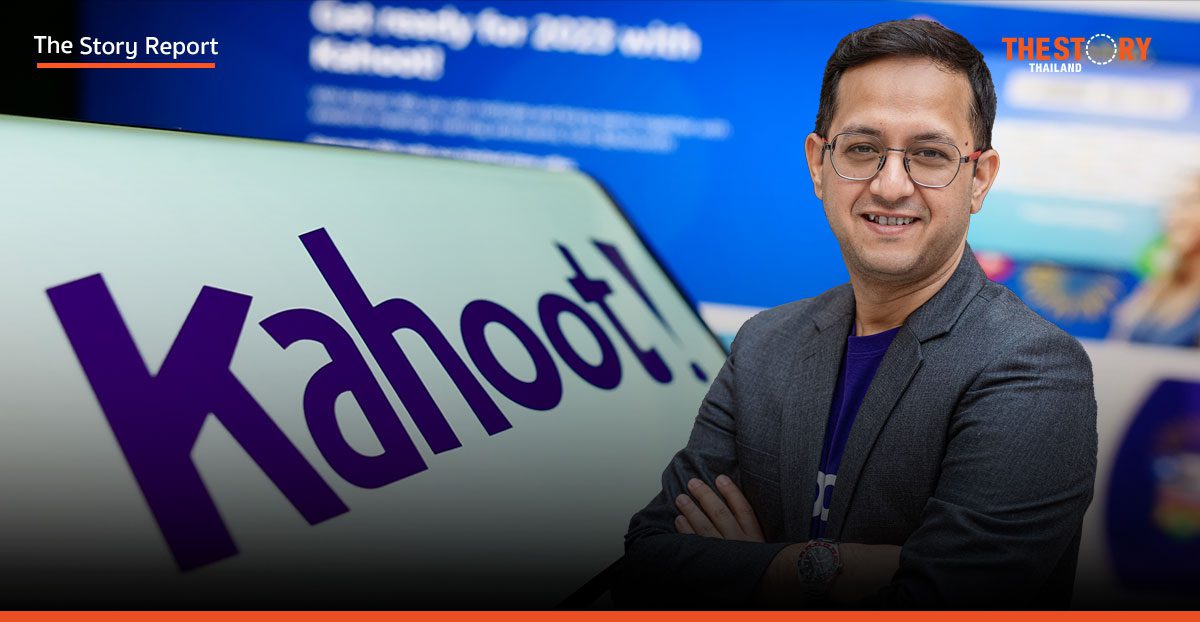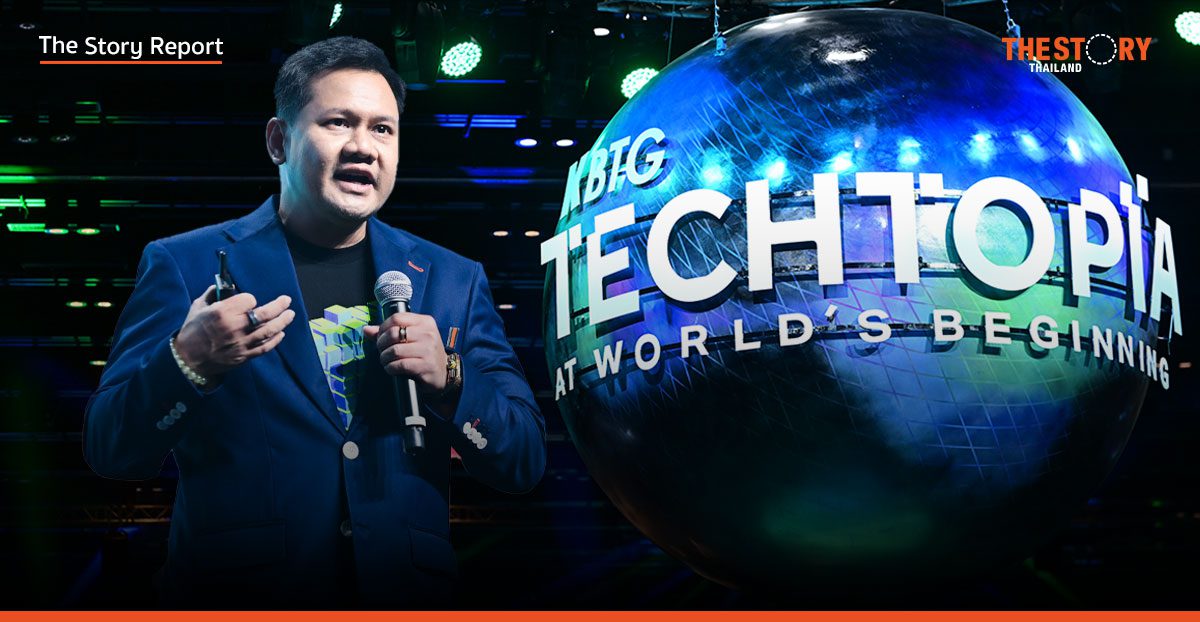Kahoot, a global learning and engagement platform, is focusing on Thailand as a priority market within the Asia-Pacific (APAC) region, with its recent launch of localized content and Thai language support, a senior executive says.
Ahteram Uddin, Kahoot’s APAC Vice President for Commercial, said that Thailand is the first Southeast Asian market to receive a localized language version of the platform, due to the substantial user demand and high usage growth.
“We’ve been getting a lot of requests from Thai users. … We look at the users’ growth. When we saw that usage, we decided to focus on Thailand and then we started with localization,” Uddin told The Story Thailand.
“Now we have Thai language release so we can generate and run Kahoot in Thai. We are growing our presence here where we’ll be working on more partnerships.”
Local feel for users
Uddin reckoned that content from Thai creators on the platform would provide Thai users with a “100% local experience”, rather than relying on English or global content.
Kahoot’s Thai version is available on its web platform, as well as the iOS and Android mobile apps, Uddin disclosed in his article published on the company’s website in December.
“With Kahoot now available in Thai, millions of Thai speakers –including teachers, students, employees, families, and lifelong learners – can enjoy a more personalized and easy-to-use experience,” he wrote.
With the launch of its Thai version, Kahoot is now available in 20 languages, including multiple other Asian languages – Japanese, Chinese, Korean, and Indonesian. More than 1 million teachers in Asia-Pacific (over 130,000 of them in Thailand) are using Kahoot with their students, as well as over 200 million participants at school, work, and home over the past year, according to Uddin.
“Our localization efforts are a key part of how we’re investing in growth in APAC, as we continue to connect more educators, students, businesses, families, and social users across the region with digital tools to elevate learning,” the VP said.
“As we expand our presence in APAC, we’re committed to ensuring that every educator and learner across the region can easily access and use Kahoot’s solutions to foster interactive and engaging learning anywhere.”
Simple key to success
The Kahoot VP also emphasized Thailand’s significance as a priority market in the Asia-Pacific region. “Definitely Thailand is one of the priority markets for us,” he said, adding that other key APAC markets include Vietnam, Indonesia, Malaysia, Singapore, and India.
“We have users almost everywhere in Asia Pacific. At the same time, we will be working with partners and educators across the region.”
When asked about Kahoot’s expansion plan in Thailand, the VP said: “Our key to success is simple. We’ll follow the same philosophy: Make the platform so good, so relevant for Thai users that a revenue automatically follows.”
He stressed, however, that Kahoot does not rely on marketing or paid user acquisitions to do business in Thailand or elsewhere. Instead, it focuses on building an ecosystem entirely in the Thai language, making it so appealing to users that they convert into premium subscribers for advanced services.
Among Kahoot’s content partners are Cambridge University Press, Britannica, Macmillan Education, National Geographic, Time Kids, Disney, Marvel, and Angry Birds.
To ensure seamless integration, Kahoot also has partnerships with such popular platforms as Microsoft Teams, Zoom, Google Classroom, and Apple Schoolwork.
The free version of Kahoot has limited options. For example, in a session an educator cannot host more than 40 students, compared to 2,000 in the premium version. Also, subscribers have access to a library of premium content from Kahoot’s partners.
“If you’re doing research, analysis or presentation, or creating a question bank, you have all the references automatically available here,” Uddin said.
‘Kahoot’ becomes a verb
Founded in 2012 and headquartered in Oslo, Norway, Kahoot emerged as a collaborative initiative between the Norwegian University of Science and Technology and its co-founders Morten Versvik, Johan Brand, and Jamie Brooker. In 2013, the learning platform made its commercial public debut – initially as a free quiz-based game. It swiftly gained traction and grew to become a global sensation among educators, students, and corporate users alike.
The New York Times once reported that Kahoot has become a pop culture phenomenon in schools and learning environments, with “kahooting” being used as a verb.
“We have 11 billion participants across the globe. We get 1.6 billion participants every year,” Uddin said.
In Thailand alone over the last 12 months, Kahoot has drawn about 20 million participants, and more than 2 million learning sessions have been created, according to the VP.
“It’s used in school as well as corporate learning and development. On corporate side, we have seen 50% growth in usage in last 12 months,” he said.
Kahoot claims that 97% of Fortune 500 companies and the world’s top 500 universities use the online learning platform.
‘We simplify learning’
On its website, Kahoot describes itself as “a global learning and engagement platform company that wants to empower everyone, including children, students, and employees, to unlock their full learning potential.”
Uddin said Kahoot makes learning easier for users. “We simplify learning. We gamify learning, and we make learning awesome. With technology, we we’ve taken the complication out of the whole learning.”
He added that online learning platforms like Kahoot encourage lifelong learning. “You don’t have to be in a classroom to learn. You could be learning on your phone, on the move.”
Uddin said that a challenge for Kahoot is to communicate that it is more than a quiz platform.
“For us, the key to success is localization and awareness that we are more than a quiz platform that you have seen as free. Rather, you should experience what we can do.”
According to the VP, more than half of Kahoot’s 600-strong workforce is focused on research & development and product enhancements.
“Our products are so engaging because we are a product-first company. We have serious investment in products and services, and everything else comes after that,” he said.
Kahoot Group is listed on the Oslo Stock Exchange, with aggregated revenue of US$500 million (16.8 billion baht) between 2020 and 2023.
Since January 2024, the company is owned by US investment bank Goldman Sachs, American growth equity firm General Atlantic, and Danish investment group Kirkbi, which owns Lego.
KBTG Labs: AI Research Powerhouse to Drive Market Innovation
orbix INVEST debuts its first “trigger strategy”, targeting a 20% return in six months












